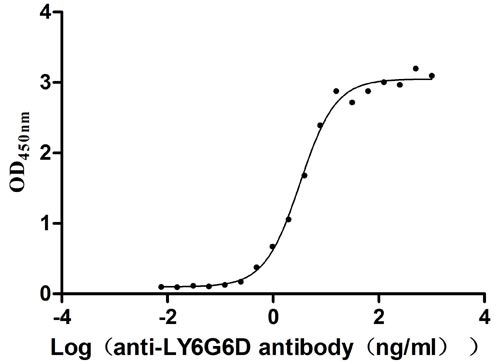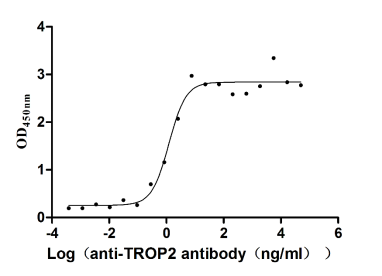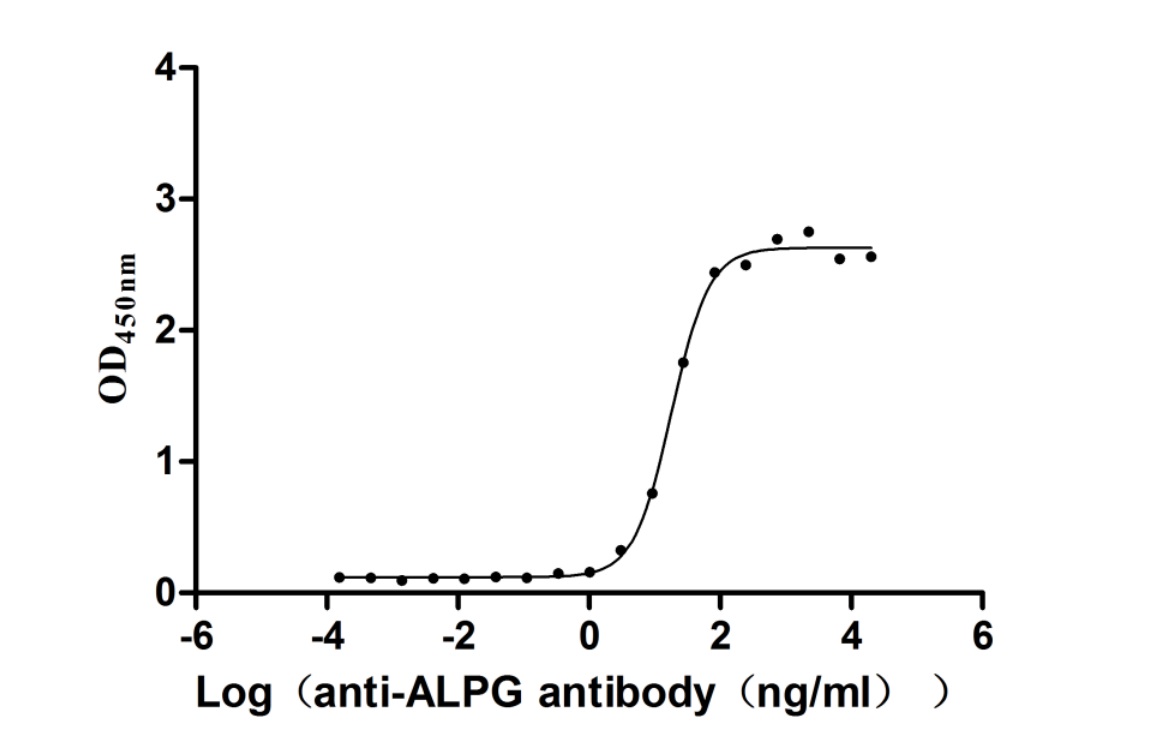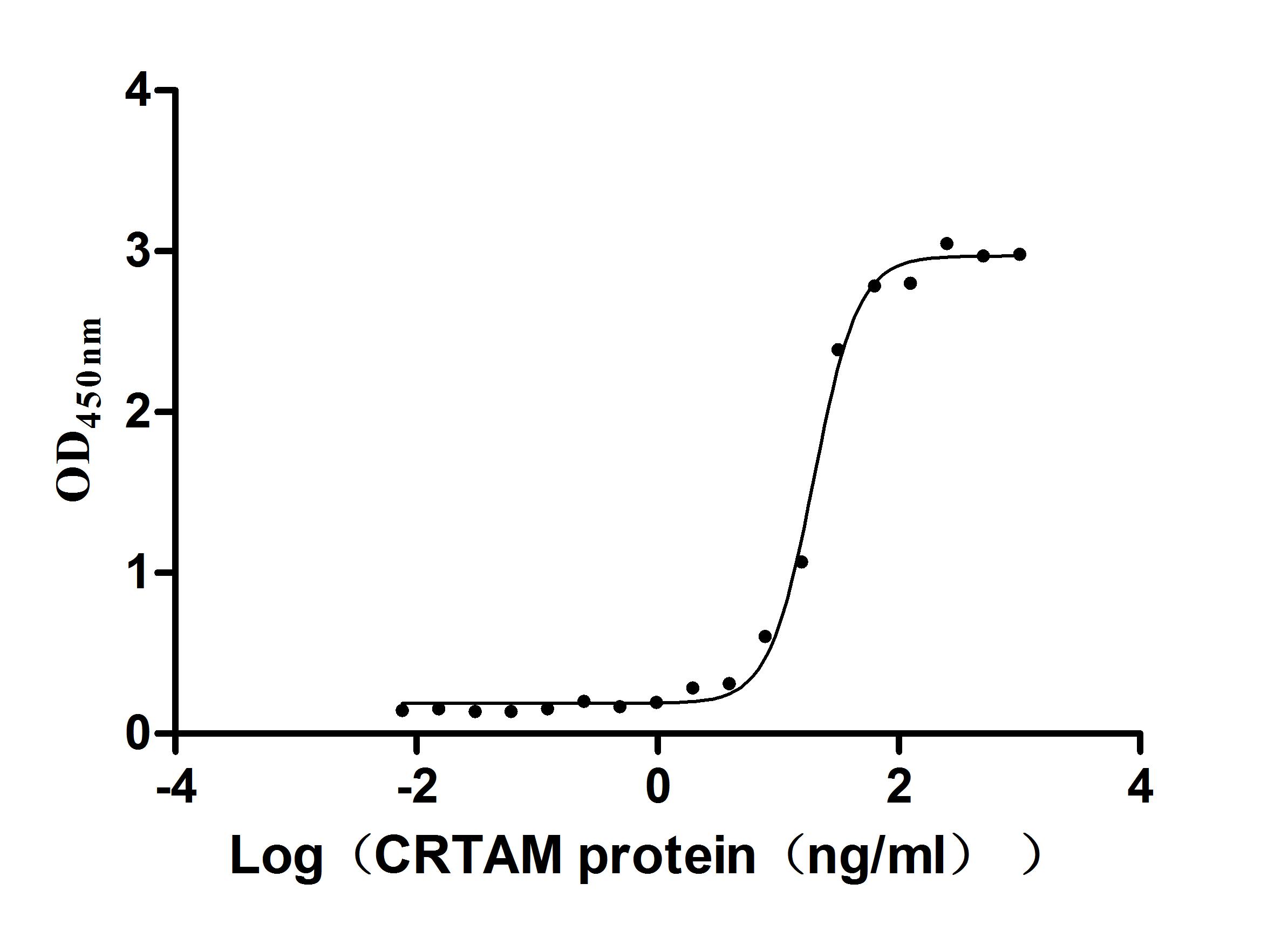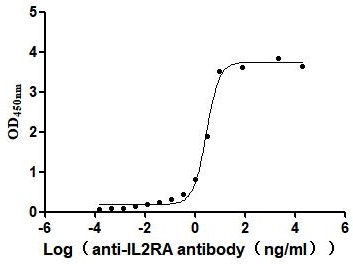Recombinant Human CCN family member 1 (CCN1)
-
货号:CSB-YP006463HU
-
规格:
-
来源:Yeast
-
其他:
-
货号:CSB-EP006463HU-B
-
规格:
-
来源:E.coli
-
共轭:Avi-tag Biotinylated
E. coli biotin ligase (BirA) is highly specific in covalently attaching biotin to the 15 amino acid AviTag peptide. This recombinant protein was biotinylated in vivo by AviTag-BirA technology, which method is BriA catalyzes amide linkage between the biotin and the specific lysine of the AviTag.
-
其他:
-
货号:CSB-BP006463HU
-
规格:
-
来源:Baculovirus
-
其他:
-
货号:CSB-MP006463HU
-
规格:
-
来源:Mammalian cell
-
其他:
产品详情
-
纯度:>85% (SDS-PAGE)
-
基因名:CYR61
-
Uniprot No.:
-
别名:3CH61; CCN 1; CCN family member 1; CCN1; CYR 61; Cyr61; CYR61 protein; CYR61_HUMAN; Cysteine rich angiogenic inducer 61; Cysteine rich heparin binding protein 61; Cysteine-rich angiogenic inducer 61; GIG 1; GIG1; IBP-10; IGF-binding protein 10; Igfbp 10; IGFBP-10; Igfbp10; Insulin like growth factor binding protein 10; Insulin-like growth factor-binding protein 10; Protein CYR61; Protein GIG1
-
种属:Homo sapiens (Human)
-
蛋白长度:Full Length of Mature Protein
-
表达区域:25-381
-
氨基酸序列TCPAAC HCPLEAPKCA PGVGLVRDGC GCCKVCAKQL NEDCSKTQPC DHTKGLECNF GASSTALKGI CRAQSEGRPC EYNSRIYQNG ESFQPNCKHQ CTCIDGAVGC IPLCPQELSL PNLGCPNPRL VKVTGQCCEE WVCDEDSIKD PMEDQDGLLG KELGFDASEV ELTRNNELIA VGKGSSLKRL PVFGMEPRIL YNPLQGQKCI VQTTSWSQCS KTCGTGISTR VTNDNPECRL VKETRICEVR PCGQPVYSSL KKGKKCSKTK KSPEPVRFTY AGCLSVKKYR PKYCGSCVDG RCCTPQLTRT VKMRFRCEDG ETFSKNVMMI QSCKCNYNCP HANEAAFPFY RLFNDIHKFR D
-
蛋白标签:Tag type will be determined during the manufacturing process.
The tag type will be determined during production process. If you have specified tag type, please tell us and we will develop the specified tag preferentially. -
产品提供形式:Lyophilized powder
Note: We will preferentially ship the format that we have in stock, however, if you have any special requirement for the format, please remark your requirement when placing the order, we will prepare according to your demand. -
复溶:We recommend that this vial be briefly centrifuged prior to opening to bring the contents to the bottom. Please reconstitute protein in deionized sterile water to a concentration of 0.1-1.0 mg/mL.We recommend to add 5-50% of glycerol (final concentration) and aliquot for long-term storage at -20℃/-80℃. Our default final concentration of glycerol is 50%. Customers could use it as reference.
-
储存条件:Store at -20°C/-80°C upon receipt, aliquoting is necessary for mutiple use. Avoid repeated freeze-thaw cycles.
-
保质期:The shelf life is related to many factors, storage state, buffer ingredients, storage temperature and the stability of the protein itself.
Generally, the shelf life of liquid form is 6 months at -20°C/-80°C. The shelf life of lyophilized form is 12 months at -20°C/-80°C. -
货期:Delivery time may differ from different purchasing way or location, please kindly consult your local distributors for specific delivery time.Note: All of our proteins are default shipped with normal blue ice packs, if you request to ship with dry ice, please communicate with us in advance and extra fees will be charged.
-
注意事项:Repeated freezing and thawing is not recommended. Store working aliquots at 4°C for up to one week.
-
Datasheet :Please contact us to get it.
相关产品
靶点详情
-
功能:Promotes cell proliferation, chemotaxis, angiogenesis and cell adhesion. Appears to play a role in wound healing by up-regulating, in skin fibroblasts, the expression of a number of genes involved in angiogenesis, inflammation and matrix remodeling including VEGA-A, VEGA-C, MMP1, MMP3, TIMP1, uPA, PAI-1 and integrins alpha-3 and alpha-5. CCN1-mediated gene regulation is dependent on heparin-binding. Down-regulates the expression of alpha-1 and alpha-2 subunits of collagen type-1. Promotes cell adhesion and adhesive signaling through integrin alpha-6/beta-1, cell migration through integrin alpha-v/beta-5 and cell proliferation through integrin alpha-v/beta-3.
-
基因功能参考文献:
- CYR61 could be an adjuvant biomarker associated with the inflammatory activity of Graves' orbitopathy (GO). PMID: 28548552
- Serum CCN1 concentrations in Acute Heart Failure patients were significantly increased compared with those in individuals without Acute Heart Failure (237 pg/ml vs. 124.8 pg/ml, p< 0.001). PMID: 30045012
- Results show that mRNA and serum expression levels of Cyr61, CTGF, and VEGF in muscle tissues of patients with polymyositis (PM)/dermatomyositis (DM). These data suggest that these genes may be involved in the pathogenesis mainly by affecting the formation of blood vessels and promoting inflammatory response. PMID: 30142763
- the CC genotype of CYR61significantly increased the risk of acute myeloid leukemia (AML) in the dominant inheritance and the recessive inheritance. Additionally, it was shown that the rs2297141 and rs6576776 genotypes were associated with AML-M5 and AML-M2, respectively. Our findings indicated that genetic polymorphisms in the CYR61 gene may be considered potential AML risk factors in the Han Chinese population PMID: 30142822
- Study describes how cysteine-rich 61 (CCN1) promotes monocyte migration by upregulating monocyte chemoattractant protein-1 (CCL2) expression in osteoblasts in rheumatoid arthritis (RA) disease. CCN1 could serve as a potential target for RA treatment. PMID: 28341837
- MiR-365 acts as a tumor suppressor in OS, partly, by targeting CYR61 expression. PMID: 29287201
- CCN1 may be involved in the progression of the hepatic cirrhosishepatocellular carcinoma axis through regulating Hepatic stellate cells. PMID: 29286082
- study is the first to reveal that Cyr61 is elevated in ALL and promotes cell survival through the AKT/NF-kappaB pathway by up-regulating Bcl-2. PMID: 27725691
- PPARgamma agonists may have beneficial effects on the migration and invasion of rheumatoid arthritis-fibroblast-like synoviocytes via the downregulation of Cyr61. PMID: 27456070
- CCN1 stimulates CCL20 production in vitro and in vivo, and thus supports the notion that overexpressed CCN1 in hyperproliferating keratinocyte is functionally involved in the recruitment of inflammatory cells to skin lesions affected by psoriasis. PMID: 28602508
- Plasma Cyr61 concentration in pulmonary arterial hypertension (PAH)patients was highly increased. Cyr61 could promote pulmonary arterial smooth muscle cells proliferation via AKT pathway, indicating that Cyr61 may play a role in the pathogenesis of PAH. PMID: 28824319
- Cyr61 and VEGF expressions were independent prognostic indicators of overall survival and may serve as important prognostic predictors in patients with osteosarcoma. PMID: 28647210
- our study suggests that suppression of Cyr61 in cancer stem cell-like cells in PDAC may inhibit tumor cell metastasis after resection of the primary tumor. PMID: 27705906
- CYR61 promotes breast cancer lung metastasis by facilitating tumor cell extravasation and protecting from anoikis during initial seeding to the lung. PMID: 27911269
- Knockdown of CYR61 in gastric cancer AGS cells impairs the cancer cell migration and invasion, suggesting a driver role of CYR61 in metastasis. PMID: 27105510
- This study is the first to describe how CCN1 promotes VEGF expression in osteoblasts and increased endothelial progenitor cells angiogenesis in rheumatoid arthritis disease. PMID: 27465842
- Two interacting partners of urokinase-type plasminogen activator (uPA) receptor, the cysteine-rich angiogenic inducer 61 (Cyr61) and the Y-box-binding protein 1 (YB-1) were identified and their differential expression demonstrated in the triple-negative breast cancer (TNBC) cells as well as in tumors. PMID: 27286449
- collagen II-activated phosphorylated-DDR2 induces CYR61 through activation of transcription factor activator protein 1 (AP-1). The elevated CYR61, in turn, accelerates MMP1 production via ETS1 (ETS proto-oncogene 1). PMID: 27653023
- Cyr61 stimulated MMP-3 production in fibroblast-like synoviocytes of rheumatoid arthritis patients. PMID: 27585710
- Low CCN1 expression is associated with esophageal cancer. PMID: 29055676
- this study found that expression of Cyr61 was higher in the ectopic endometrium than in the eutopic endometrium and that Cyr61 expression in the endometrium was correlated with age, number of natural labors, blood loss, uterine volume, adenomyosis type, and concurrent endometriosis PMID: 27644084
- The role of CYR61 in aromatase inhibitors resistance in estrogen receptor positive breast cancer patients PMID: 27113745
- CYR61 is a TGF-beta-induced stromal-derived factor that regulates gemcitabine sensitivity in pancreatic ductal adenocarcinoma. PMID: 27604902
- These studies support previously unrecognized, cooperative interaction between the CCN1 matricellular protein and canonical TGF-beta1/SMAD3 signaling that promotes lung fibrosis. PMID: 26884454
- Our data indicate a potential functional impact of Cyr61 in development and the progression of cervical cancer PMID: 28476813
- results highlight both CYR61 and TAZ genes as potential predictive biomarkers for stratification of the risk for development of adenocarcinoma and suggest a potential mechanistic route for Barrett's esophagus neoplastic progression PMID: 27583562
- Reduced levels of CCN1 and CCN3, as found in early-onset preeclampsia, could contribute to a shift from invasive to proliferative extravillous trophoblasts and may explain their shallow invasion properties in this disease. PMID: 26744771
- Promoter activity was determined as well as CYR61 mRNA and protein expression. PMID: 28322825
- Our results not only reveal a novel mechanism illustrating the role of Cyr61 in epidermis pathogenesis but also suggest that therapies targeting Cyr61 may represent a novel strategy in the treatment of psoriasis vulgaris. PMID: 27856305
- Results provide evidence that CCN1 can stimulate the proliferation and differentiation of osteoblasts in vitro and contribute to bone remodeling in vivo in myeloma bone disease. PMID: 28035364
- these data suggest that the WNT/beta-catenin signaling pathway enhances pancreatic cancer development and malignancy in part via up-regulation of CYR61. PMID: 27889647
- CCN1 RNAi reduced the mRNA and protein expression levels of CCN1, Akt and VEGF in the HUVECs (P<0.05). Furthermore, LY294002 reduced the mRNA and protein expression levels of CCN1 in the hypoxic cells (P<0.05). Therefore, CCN1 RNAi may offer a novel therapeutic strategy, which may aid in the treatment of pathological angiogenesis via inhibition of the PI3K/AktVEGF pathway PMID: 27666419
- High CYR61 expression is associated with colorectal cancer. PMID: 27743169
- Following the treatment of B16 cells with epirubicin and IFN-a, CYR61 levels increased, cell growth was inhibited, and proliferating cell nuclear antigen expression decreased. Thus, CYR61 could become a therapeutic target for malignant melanoma patients with high CYR61 expression. PMID: 27665942
- The present study aimed to examine the clinical relevance of NOV along with CYR61 and CTGF in gastric cancer by analysing their transcript levels...the expression of NOV and CYR61 was increased in gastric cancer. The elevated expression of CYR61 was associated with poorer survival. NOV promoted proliferation and invasion of gastric cancer cells PMID: 27633176
- Taken together, our results provide novel insights into the possible protective role of 7,8-DHF by activating Cyr61 signaling and suppressing ER stress in hypoxic HK-2 cells which have potential clinical implications for the treatment of AKI. PMID: 28116298
- up-regulated in epithelial cells of salivary glands of primary Sjogren's syndrome patients PMID: 26630293
- Data show that RNA silencing of CCN family member 1 protein (CCN1) inhibits umbilical vein endothelial cell (HUVEC) proliferation under hypoxic conditions by inhibiting phosphoinositide 3-kinase (PI3K)/AKT protein signaling. PMID: 26459773
- Studies indicate that the CYR61 CTGF NOV matricellular proteins (CCN family of proteins) comprises the members CCN1, CCN2, CCN3, CCN4, CCN5 and CCN6 and have been identified in various types of cancer. PMID: 26498181
- Results suggest that Cyr61 is induced by EGF through the ERK/CREB signal pathway and that it plays a crucial role in the migration and invasion of anaplastic thyroid cancer cells. PMID: 25773758
- CCN1 is an injury response protein that functions not only to restrict fibrosis in the liver, but also to suppress hepatocarcinogenesis by inhibiting EGFR-dependent hepatocyte compensatory proliferation PMID: 26028023
- we demonstrate that NF2 negatively controls the invasiveness of Glioblastoma multiforme through YAP-dependent induction of CYR61/CCN1 and miR-296-3p. PMID: 26923924
- It promotes cell growth and angiogenesis in cancers through its interaction with several integrins and proved to be an independent prognostic factor for patient survival. PMID: 26201842
- c-Src regulates secreted proteins, including the exosomal Cyr61, which are involved in modulating the metastatic potential of triple negative breast cancer cells. PMID: 25980494
- Report shows evidence that CCN1 is O-fucosylated at Threonine 242 and that O-fucosylation of CCN1 regulates its secretion. PMID: 26424659
- Reactive oxygen species increased c-Jun, a critical member of transcription factor AP-1 complex, and increased c-Jun binding to the AP-1 site of the CCN1 promoter. PMID: 25536346
- Overexpression of Cyr61 may induce epithelial-mesenchymal transition and therefore leads to laryngeal squamous- cell carcinoma invasion and metastasis and poor prognosis. PMID: 25854342
- Cyr61 promotes CD204 expression and the migration of macrophages via MEK/ERK pathway in esophageal squamous cell carcinoma PMID: 25620088
- Report is first to suggest a relationship between a genetic variant p.R47W in CCN1 and atrial septal defects in humans. PMID: 25135600
- SYK is downstream of CYR61 and contributes to CYR61-mediated mitoxantrone resistance. The CYR61-SYK pathway represents a potential target for reducing stroma-induced chemoresistance PMID: 25974135
显示更多
收起更多
-
亚细胞定位:Secreted.
-
蛋白家族:CCN family
-
数据库链接:
HGNC: 2654
OMIM: 602369
KEGG: hsa:3491
STRING: 9606.ENSP00000398736
UniGene: Hs.8867
Most popular with customers
-
Recombinant Human Mucin-16 (MUC16), partial (Active)
Express system: Mammalian cell
Species: Homo sapiens (Human)
-
Recombinant Human Tumor necrosis factor ligand superfamily member 8 (TNFSF8), partial (Active)
Express system: Mammalian cell
Species: Homo sapiens (Human)
-
Recombinant Human Angiopoietin-2 (ANGPT2) (Active)
Express system: Mammalian cell
Species: Homo sapiens (Human)
-
Recombinant Human Lymphocyte antigen 6 complex locus protein G6d (LY6G6D) (Active)
Express system: Yeast
Species: Homo sapiens (Human)
-
Recombinant Human Tumor-associated calcium signal transducer 2 (TACSTD2), partial (Active)
Express system: Mammalian cell
Species: Homo sapiens (Human)
-
Recombinant Human Alkaline phosphatase, germ cell type (ALPG) (Active)
Express system: Mammalian cell
Species: Homo sapiens (Human)
-
Recombinant Human Cell adhesion molecule 1 (CADM1), partial (Active)
Express system: Mammalian cell
Species: Homo sapiens (Human)
-
Recombinant Human Interleukin-2 receptor subunit alpha (IL2RA), partial (Active)
Express system: Mammalian cell
Species: Homo sapiens (Human)


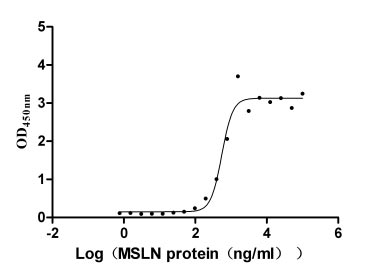
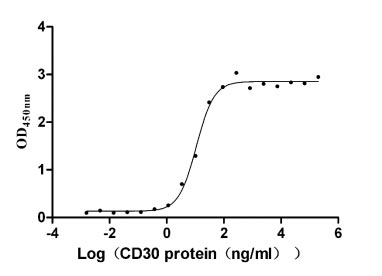
-AC1.jpg)
